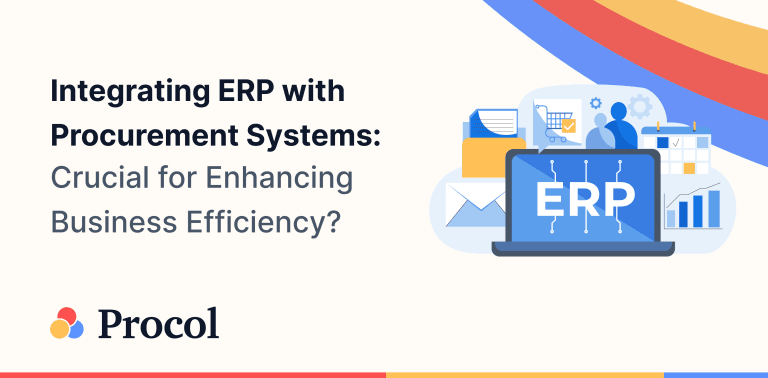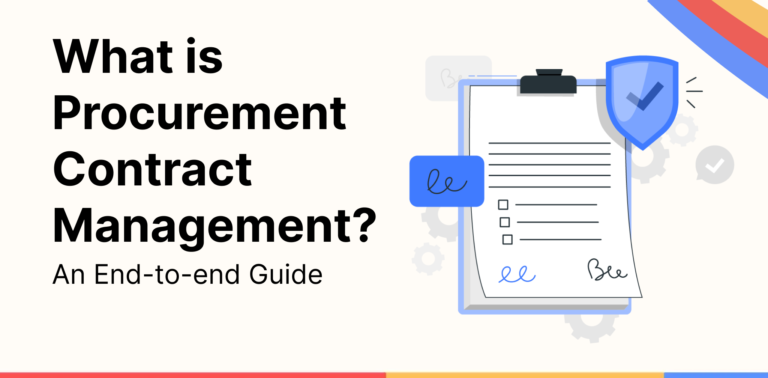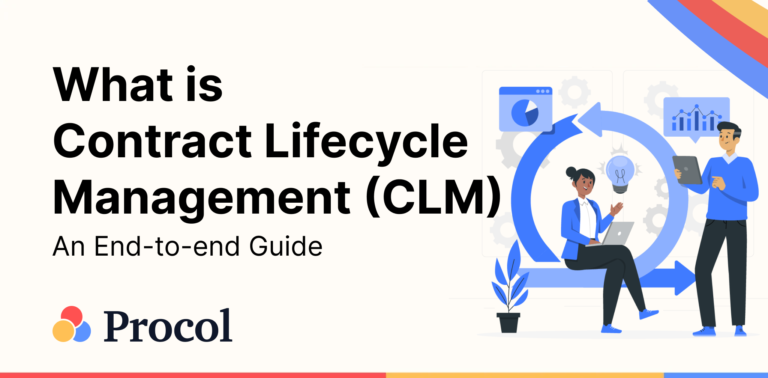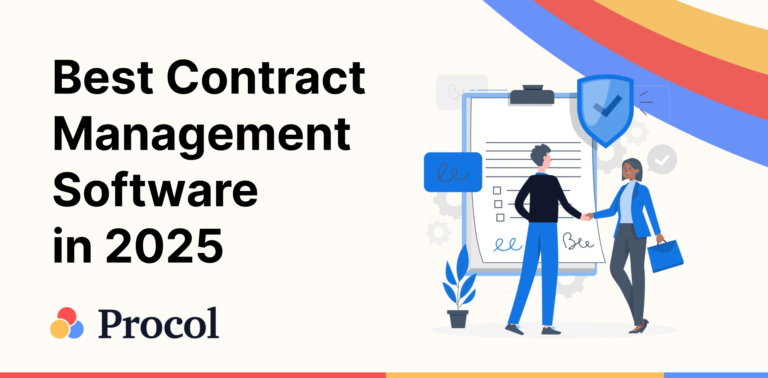Procol • February 18, 2025
Why is ERP in Procurement Systems Important for Business Efficiency?

Introduction
Today, many businesses engage in time-consuming procurement processes and constantly innovate to stay ahead of their business rivals. As companies grow and scale, the complexity of managing various business processes increases exponentially. Enterprise Resource Planning or ERP in procurement software is an answer to this problem. It emerges as a backbone as it brings diverse business processes, such as procurement, accounting, human resources, manufacturing, operations, etc., into one secure, centralized place and plays a crucial role in decision-making.
If your business is having difficulty handling complex processes, integrating enterprise resource planning software is a cost-effective method to boost business efficiency, reduce costs, improve productivity, and help streamline processes that require manual intervention. Thus, managers can access real-time data in just a few clicks, eliminating duplicate efforts. This integration optimizes collaboration between suppliers and customers and helps businesses easily overcome challenges faced by complex procurement processes.
Let’s dig deep to understand more about the ERP in procurement systems, its features, benefits, p2p ERP, the impact of the Enterprise Resource Planning system on business efficiency, and more.
What is an ERP in a Procurement Software?
Procurement in a business refers to the buying process, such as goods and services from suppliers. When procurement integrates with ERP, it effectively manages the entire procurement process, including finance, distribution, tracking spending, invoice, production, planning, inventory, etc. With Enterprise Resource Planning, businesses can easily manage their resources, saving time and money. In other words, ERP in procurement software controls the overall cost in a procurement process for goods and services, saving money.
ERP systems in companies manage everything from procurement requests to invoice receipts. Thus, it must be on the wishlist of organizations that plan to strive in this competitive business environment. Here are a few components of procurement:
-
Purchase Order Management (PO) is the heart of the procurement process. It contains every detail, such as the delivery date and customer information.
-
Contract Management is the financial centre of a business that simplifies business processes such as creating contract templates and missed delivery dates and simplifies contract lifecycle management.
-
Supplier Relationship Management (SRM) manages relationships, which is an essential task in a business. A good supplier relationship needs transparency, understanding, and trust. An ERP procurement module balances procurement, buying processes, inventory controls, and other aspects.
The above component helps businesses manage the procurement process efficiently by streamlining every business process and managing each process smoothly.
Benefits of ERP in Procurement Software
Procurement ERP software offers various benefits, including performing all business activities hassle-free and in less time, just with a few clicks. Moreover, having a robust purchase order ERP in procurement software lets you achieve business goals by increasing efficiency, reducing cost, and allowing you to make an informed decision. Here are a few benefits of having an ERP procurement system.
-
Tracking: It is best when it comes to product tracking. The system will notify of all notifications regarding sent or received goods or services, simplifying the inventory and shipping process and avoiding duplication. Businesses can track contracts and supplies, ensuring suppliers adhere to policies and standards and reducing procurement contract risks.
-
Relationship management: As the business grows, you must handle complex processes. Sometimes, you need help managing relationships with your suppliers and vendors. AnERP in procurement software helps you keep all information, such as contracts, pricing, orders, payments, etc., on a single database to synchronize processes and maintain a transparent relationship.
-
Single data source: Having a single data source allows all team members to avoid miscommunication and work on similar numbers, which prevents mistakes and poor decision-making. Thus, a centralized system facilitates transparency, which is best for accessing documents and other information.
-
Better reporting and analysis: An ERP purchasing system has better reporting tools that provide real-time information, such as cost, defects, delivery, etc., to help businesses make ordering decisions.
-
Cost tracking: Cost tracking, such as shipping, ordering, taxes, etc., keeps target on the business’s financial projections and gives you insight into cost per unit over time, which can help save money. The system reduces the processing time and increases accuracy by simulating the high volume and time-consuming tasks. By getting a clear view of funds availability, the procurement teams can make strategic plans to eliminate overspending, leading to control in financial activities.
Key Features of ERP in Procurement Software
There are various vital features to procurement ERP software. Let’s take a look at a few key features that are important in an ERP in procurement software to improve collaboration and streamline operations for business growth and success:
-
Document management: Without an ERP system, it becomes a daunting task for an organization to manage a bulk of paper-work as it requires vast labor, time, resources, and money to keep everything in place, which might lead to human errors but having a document management system in an ERP makes it easier to store documentation seamlessly into a centralized place.
-
Cost calculation: This feature helps business owners understand the total cost required for product purchasing and other factors like tax. It also limits overspending.
-
Real-time data analysis: The real-time data analysis feature reduces errors and manual tasks, making it easier to make informed business decisions. Thus enhancing efficiency and productivity.
-
Customization: Having an ERP purchasing system that is customizable to meet business needs makes it easier to expand a business. Thus, teams can easily integrate CRM, inventory management, and cost as per the orders.
-
Vendor rating: Another essential feature is vendor rating. It helps businesses access vendors and measure their previous performance based on services offered, timely delivery, quality, etc.
What is the ERP Procurement Process Flow
The ERP procurement process flow requires various steps, from requesting material to adding records. There are 7 stages of p2p ERP: requesting material, solicitation, request for quotation, evaluation, order management, purchase invoice, and entry of records. Check out the procure-to-pay process in detail:
-
Material Request: The material request is first raised electronically to the procurement team. Once the purchased request is approved after checking the needs of the desired goods or services and cross-checking for the budget’s availability, the approved request for purchase is called a PO (purchase order).
-
Solicitation: After getting approval, the procurement team develops a plan for solicitation. After budget approval, the request for bidding opens and is sent to suppliers along with the expectation, quantity, and terms & conditions.
-
Request Supplier Quotation: Suppliers then post their rates as per the mentioned quantity and delivery time.
-
Evaluation: Once the solicitation process is closed, the procurement team will review all the bids and the delivery time to find the best fit for the business.
-
Purchase Order: A purchase order (PO) is issued to the selected supplier, the contract negotiation and signing are completed, and the PO is then sent to the supplier. If the supplier accepts the PO, the contract is activated.
-
Purchase Invoice: When the terms for the purchase order are matched and met without issue, the seller will issue the purchase invoice that includes agreed rates and payment choices.
-
Payment Entry: After getting the purchase invoice, payment is made to the vendor as per the terms mentioned in the contract. The record of buyer and purchase request documents and payment invoices are then stored for bookkeeping and auditing.
What is the Impact of ERP in Procurement Software on Business Efficiency?
ERP in procurement software has completely transformed business processes, letting them manage their operations through a central data source, bringing processes under one umbrella, enhancing business efficiency, and improving internal communication and productivity.
Purchase order ERP collects customer and supplier data to ensure a smooth purchasing process and timely delivery. It also serves supply chain stakeholders with accessible real-time purchase orders and end-customer information to help expedite sales and enhance customer experience. Here are the ways the ERP in procurement software impacts business efficiency:
-
Streamlined Communication and Collaboration: It allows proper communication among stakeholders and employers to ensure all parties agree. This will further help reduce costs, errors, etc.
-
Scalability and Flexibility: ERP’s scalability and flexibility are essential for business expansion. As businesses grow, their processes become complex, making it hard to rely on paper-based processes and demanding a robust system. Procurement ERP software is best for fulfilling a business’s needs as it bridges the gap between technology, data, and people, saving resources, money, and, most importantly, time. Thus, ERP in procurement software can handle complex data and volume seamlessly without compromising performance.
-
Management of Inventory: Businesses have the advantage of addressing all the issues, ensuring smooth operations with the help of real-time information. Also, having a solid inventory lets businesses help with cost savings.
-
Cost Reduction and Decision-Making: ERP purchasing systems help reduce costs and increase efficiency in all procurement processes by displaying real-time data analysis. This further helps managers make informed decisions regarding cost-cutting and improve team communication.
-
No more Errors: The ERP in procurement software makes errors and accuracies regarding the purchasing data more accessible to analyze. It simplifies the data without much human intervention.
How to Choose the Right ERP Software for Procurement for Your Business?
Now that you have decided to get an ERP procurement module for your business, finding the ideal ERP software for procurement to eliminate a laborious and heavy documentation process, requires a multi-faceted approach.
Here are a few steps to help you find the right ERP software for procurement for your business.
-
Business requirement and objective: The first step is to assess the company’s current processes, challenges, workflow streamlining, and data management to understand what an organization needs from ERP software for procurement. For example, do you need a system to handle an entire process or just a single one?
-
Cost consideration: Consider the cost factor as well as the other expenses that will be incurred, like maintenance and training. Cost consideration is essential if your business requires a comprehensive or affordable solution.
-
Features and other safety measures: Evaluate the features offered by the ERP procurement system to determine the right functionality for a business. Other things to keep in mind are the scalability and integration capabilities, interface, whether customization is allowed, security measures, and data protection measures.
These are a few factors in selecting a suitable procurement ERP system to satisfy business needs. Thus, make sure it’s a perfect choice per your business requirements. Thus, testing ERP procurement software is best to understand if it fits your business strategy.
Conclusion:
The procurement ERP software makes handling business processes and functions, such as supply management, inventory, cost, etc., easier without making errors or requiring human intervention. All the data is stored in the centralized database, offering real-time data visibility for every team member to view, analyze, and make informed business decisions addressing the business complexities. This, in turn, offers efficiency, flexibility, productivity, and business growth.
Explore more from Procol
Discover expert tips, how-to guides, industry insights, and the latest procurement trends.

End-to-End Guide to What is Procurement Contract Management?
Wondering what is procurement contract management, then this end-to-end guide explains...

Ultimate Guide to What is Contract Lifecycle Management (CLM)
Learn about the contract lifecycle management features and how they boost...

Best Contract Management Software in 2025: A Buyer’s Guide
Contract management software is crucial for modern business. This article explores...









